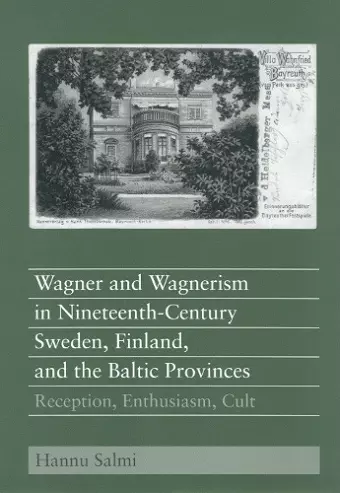Wagner and Wagnerism in Nineteenth-Century Sweden, Finland, and the Baltic Provinces
Reception, Enthusiasm, Cult
Format:Hardback
Publisher:Boydell & Brewer Ltd
Published:18th Nov '05
Currently unavailable, and unfortunately no date known when it will be back

An exploration of how Wagner's operas were performed and received in the theaters of Stockholm and other cities of the region. Wagner and Wagnerism in Nineteenth-Century Sweden, Finland, and the Baltic Provinces explores how Wagner's operas were performed and received in the theaters of Stockholm and other cities of the region and how excerpts fromthem were arranged for amateur performances in private homes. Wagner's music and his polemical writings aroused lively discussion around the Baltic, as they did everywhere else in the Western world. Thanks to detailed accounts innewspapers, journals, contemporary literature, and writings of music historians [including some by Sibelius's teacher and friend Martin Wegelius], we are privileged, in Hannu Salmi's book, to "listen in" on these debates, which often deal with crucial questions of national self-determination and of cultural independence from Europe. This text reveals the surprising extent to which music lovers and operagoers from the various countries, many of them women, traveled to Wagner's Bayreuth Festival to attend performances. It also reconstructs the imaginative and patient efforts by which confirmed Wagnerians established Wagner societies in order to promote an understanding of the composer's work. Each country, each city, each local composer and conductor shows a distinctive approach -- welcoming, resistant, or some of each -- to the challenge of Wagner. In the process, we see music history and cultural history in the making. Hannu Salmi is Professor of Cultural History at the University of Turku, author of Imagined Germany: Richard Wagner's National Utopia, and an editorial board member of wagnerspectrum.
Detailed and meticulously researched, pioneering, even more important as the documentary account of a vibrant and thriving musical culture in a complex geographical region that is only just beginning to attract scholarly interest. . . . The production quality of Salmi's book is very high. . . . Real joys for the reader are the many illustrative images of Baltic towns. * MUSIC AND LETTERS *
An extraordinary book, painstakingly researched. . . Salmi throws light on the operatic tastes and repertoire of the Baltic regions in the mid 19th century, in addition to outlining Wagner's own musical activity in the area. New to most Wagnerians will be the amount of local mythology and indeed folk music the composer absorbed during his engagement in Riga, which gave rise to . . . [apparently] traces of Livonian folklore in the final scene of Die Walku're and the 'Flieder' monologue in Die Meistersinger. . . . A model for approaching a subject of this type. -- Mike Ashman * OPERA MAGAZINE *
This book not only enlarges the understanding of Wagnerism in general in the nineteenth century, it also supplements the music histories of Baltic countries with a wealth of information and copiously detailed references. The text is delightfully illustrated. * MLA NOTES *
Wagner's connections with Scandinavia and the Baltic countries are more far-reaching than generally supposed, and Hannu Salmi's exhaustively researched study throws fascinating light on the contemporary reception of his works and ideas in that part of the world. -- Barry Millington
ISBN: 9781580462075
Dimensions: unknown
Weight: 650g
327 pages